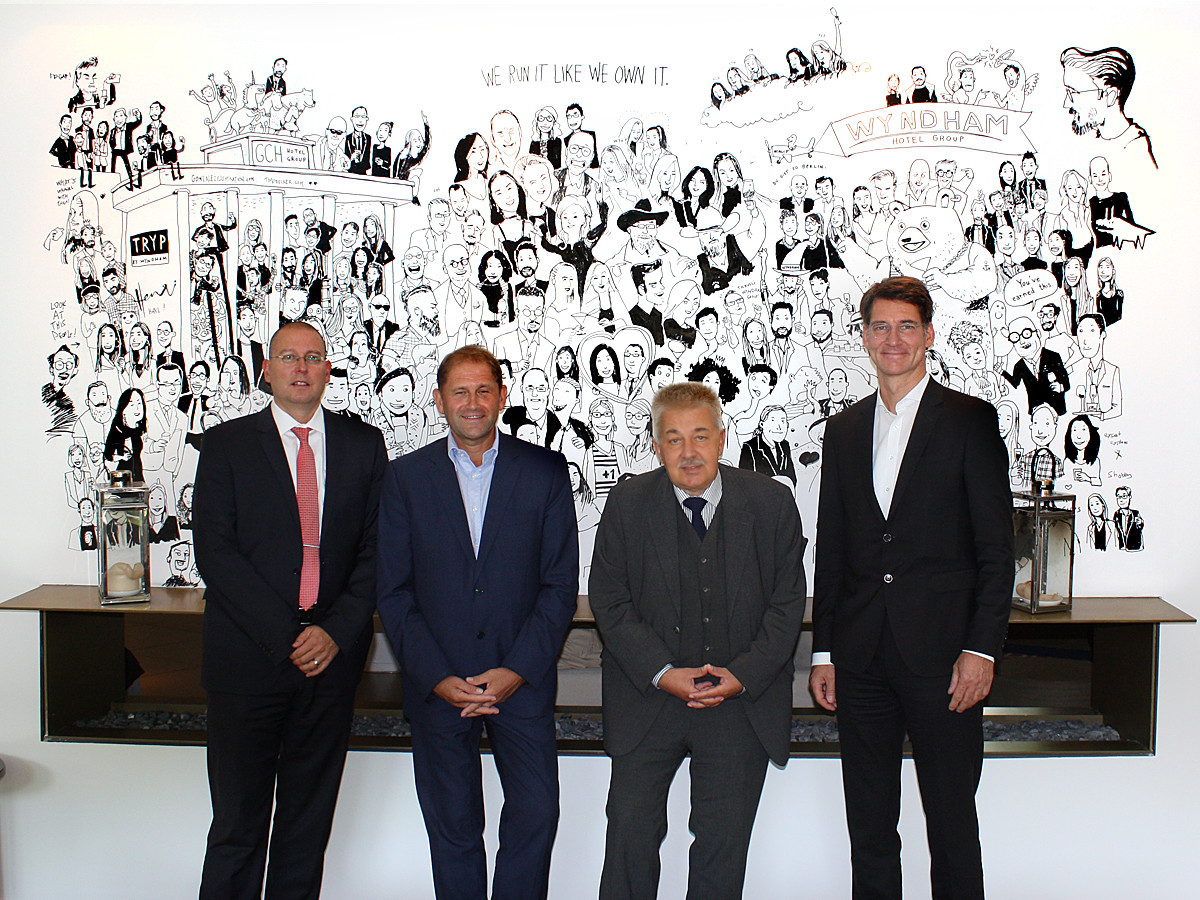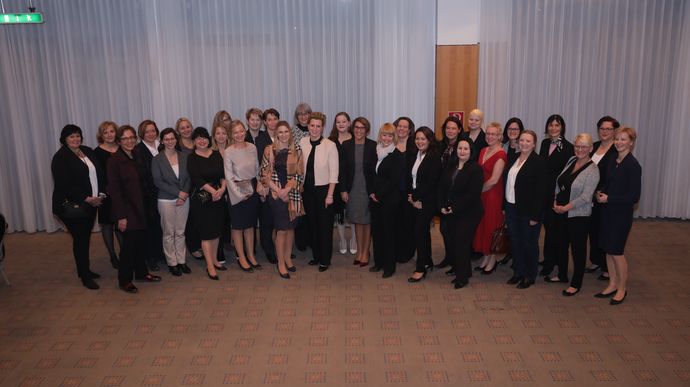‘THINK GLOBAL, ACT LOCAL’
An interview with the Area Vice Presidents & Area Directors of Operations at GCH Hotel Group

Six regions, 14 brands and over 120 hotels – the GCH Hotel Group is one of Europe’s leading hotel management companies and has been ‘AAA’-listed in the TREUGAST Investment Ranking for the third time in a row. But what is the secret behind the GCH Hotel Group’s positive results, and which current projects are helping to promote the company’s success? We spoke to our experts from the different regions: Read here our interview with the Area Vice Presidents (AVPs) and Area Directors of Operations Jan Burghardt (Region East), Jörg Schiffmann (Region West), Tino Bauer (Region Central) and Bodo Sikora (Region North and South).
1. Most of you have been with the GCH Hotel Group for a long time and have been actively involved in the company’s development in recent years. What do you feel gives you that crucial competitive advantage over other management groups?
Schiffmann: In my view, the fact that the GCH Hotel Group is one of the leading management companies in the hotel industry is due to our speed. The pace at which we are expanding sets us apart from other companies. Nowadays, speed plays a crucial role in a company’s success. And for the various stakeholders, success guarantees security and growth.
Bauer: I feel that we not only act faster, we’re also prepared to try out new things. The hotel industry is growing and changing at breakneck speed – so we need to react flexibly and think outside the box, i.e. step away from the ‘traditional hotel mentality’. The bold decision to forge new paths has often given us a competitive edge.
2. And how does the GCH Hotel Group manage to keep pace with the breakneck speed of the market while other competitors struggle?
Burghardt: The rapid development and flexibility of GCH have a lot to do with our flat hierarchies. Unlike the employees of other organisations where the hierarchical structure is more pronounced, our managers benefit from short decision-making channels in a whole range of areas, enabling us to react quickly to change. This organisational structure has progressively strengthened in recent years.
Sikora: I would have to agree there. The quick decision-making processes are also down to the close relationship with our owners. Many of the employees at the GCH Hotel Group know the owners personally – and that creates a special atmosphere.
Bauer: The atmosphere and the employees play also a big role for me. A lot of the employees have been with the GCH Hotel Group for many years and have a vested interest in seeing the company make good progress – the knowledge, the years of experience and the motivation of these employees naturally pay dividends.
3. The quick decision-making channels are particularly impressive when you consider the complex organisational structure of the GCH Hotel Group: in addition to the headquarters in Berlin, the company with its 120 hotels is divided into six regions, which you are in charge of as either Vice President or Area Director of Operations. What are the advantages of this decentralised structure?
Sikora: Given the diversity of our portfolio, it wouldn’t be possible to have any other organisational structure. We have the advantage of benefiting from all kinds of synergy effects on the one hand, but we also have a good, broad base: we have our sellers where our customers are – which is the only way to recognise our customers’ needs and adopt a customer-oriented mentality. When it comes to sales and revenue in particular, it’s important to think regionally on the one hand, but to use all of the possibilities of the headquarters structure on the other – in keeping with the motto ‘think global, act local’.
Burghardt: As Mr Sikora has said, we definitely benefit here from local knowledge and experience. Locations and markets differ, and what’s right for one location may not necessarily produce the same success in another. But there is communication between the regions in all areas of expertise, which allows us to learn from one another and adapt best practices where possible and appropriate.
4. You have already mentioned good communication and the accompanying synergy effects. How exactly does the collaboration between the individual regions work?
Bauer: Although digital networking makes communication between teams very easy, we are well aware of the importance of face-to-face communication. Regular meetings provide the individual hotels and regions with networking opportunities and make it easy to exchange ideas. When negotiating commission rates with partners, our motto is ‘Together we’re stronger’ – and we are able to combine the experience and needs of all of the regions.
Burghardt: The big advantage of the decentralised structure at GCH is the range of experience and expertise that employees from the individual regions are able to contribute. To take advantage of this, we exchange ideas on the latest developments at the meetings that Mr Bauer has already mentioned. We discuss issues relating to staff and operative areas, but also general topics relating to sales, marketing, revenue and purchasing.
Schiffmann: For me, the issue of ‘best practices’ is very important. Exchanging good examples from all operative areas helps us to optimise our processes in all of the regions on an ongoing basis, making them more efficient and reducing costs at the same time. Good networking between the regions is also noticeable when it comes to the expansion of our portfolio: when new hotels are added, GCH puts a taskforce team together to integrate them quickly into the group and reposition them.
Sikora: I think strong connections are particularly beneficial where sales and banqueting are concerned. We have customers who hold their annual meetings in our hotels but want to meet in a different town every year. Thanks to our diverse portfolio, we’re able to retain these customers, accommodating them in ‘our’ hotels – brilliant, I think you’ll agree.
5. Despite the diversity of the GCH portfolio, can you name a personal favourite project from this year?
Burghardt: I’m looking forward to seeing one or two investment projects in my region take shape. And the introduction of Salesforce too. Salesforce will mark a big step towards optimising workflows in many departments, giving us even more time for our guests and customers.
Sikora: My favourite project is our hotel in Ahlbeck, which has been comprehensively renovated and is set to reopen this year. We are proud that the owner had such faith in us and has invested so much money in the building – the hotel already has a very special place in our portfolio!
Schiffmann: As AVP for Region West, the repositioning of the Crowne Plaza Düsseldorf-Neuss under the IHG flag was very important to me. Rebranding a hotel that was run by the Swissôtel brand for 30 years isn’t easy and we’ve all had to pull together. But the success of the project once again confirms the expertise of the GCH Hotel Group.
Bauer: Just one? That’s tricky. But every successful project relies on the excellent work of our employees. So our future lies in continuing to invest in the development of our workforce. Our training calendar and leadership programme at GCH stand us in excellent stead here.
6. To round things off, let’s look to the future again: what factors do you feel are crucial to the future of the GCH Hotel Group?
Burghardt: It’s important that we continue to invest in our hotels, so that we can offer customers and guests the best possible product. We also need to use new technologies efficiently and keep pace with the digital revolution. Up until now, we have recognised the opportunities offered by digitalisation and reacted quickly, but there are new developments every day and it’s crucial not to drop the ball. If we maintain our approach, we will continue to consolidate and increase our effectiveness in operative business.
Bauer: The key to our success is consistently pressing ahead with targets and growth, and we are making every effort to continue with this. Of course, this means we constantly have to adapt to changing requirements and innovative developments – for example, by introducing new technological systems that allow us to work more efficiently and provide our customers with optimal service at all times.
Sikora: After all, we became this successful by having an exemplary business structure with clear principles that our partners can rely on at all times. For me, trust is a crucial factor for success: if we stick to our principles and have the trust of our owners, partners and customers, we will continue to grow in future and meet our goals.
Schiffmann: I can only agree with my colleagues. But as mentioned at the beginning of this conversation, speed is the crucial factor when it comes to a company’s success. That isn’t going to change in the future – quite the opposite: so it’s vital that we maintain a business structure with flat hierarchies and continue to consolidate this over the coming years. With our structure and our expertise, I am optimistic that GCH will continue to develop and expand just as successfully in the future.
>>Find out more about the top management and the regions of the GCH Hotel Group here.
Editor: Caroline Wacker










